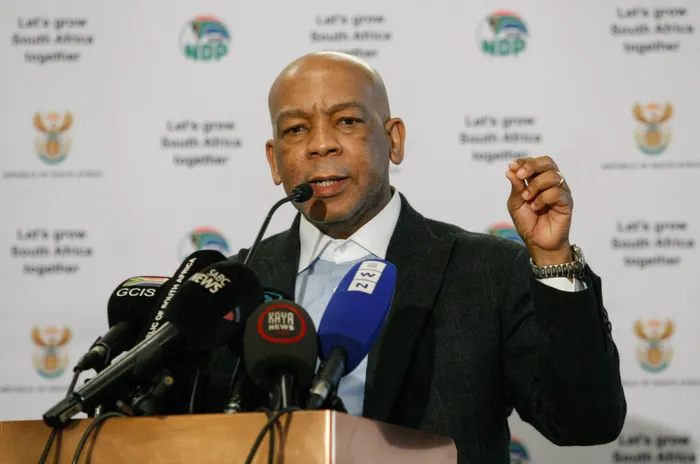Divorce from coal calls for a new romance with nuclear in the spotlight

Electricity and Energy minister Kgosientsho Ramokgopa.
Image: Jacques Naude / Independent Newspapers
After a long, sometimes loving, sometimes contemptuous marriage, our Minister of Electricity and Energy, Dr Kgosientsho Ramokgopa, has filed for divorce from coal. Well, sort of. The new Integrated Resource Plan (IRP) has set several ambitious goals for 2039 as the country transitions away from its longstanding dependence on fossil fuels, towards renewables, gas and nuclear.
The IRP has been met with both praise and critique, with some analysts citing cost-effectiveness concerns, whilst others laud its alignment with climate imperatives.
For years, solar and wind have been the seductive temptress of the energy transition dating scene, while nuclear lingered as a recluse in the corner of a dim-lit bar.
Now she gets to step into the spotlight, and all eyes are on her.
The IRP has assigned 5 200 megawatts of new nuclear generating capacity by 2039, allowing for a further expansion to 10 000 megawatts, depending on future nuclear industrialisation outcomes.
We spent more than R10 billion on the development of the Pebble Bed Modular Reactor (PBMR), which is being revived after a 15-year hiatus, and we can now aggressively pursue exciting Small Modular Reactor (SMR) possibilities.
And, they are exciting. SMRs offer scalable, factory-built nuclear solutions that can be deployed faster and at lower upfront cost than traditional large reactors. Globally, projects such as NuScale Power’s VOYGR design in the United States, Rolls-Royce’s SMR programme in the United Kingdom, and Russia’s Akademik Lomonosov floating plant have demonstrated real-world progress in modular nuclear deployment. These projects show how SMRs can enhance energy security, integrate with renewables, and bring clean, reliable power even to remote or grid-constrained regions.
For the IRP to succeed, we need the nuclear component of the plan to thrive. Here institutions such as the North-West University (NWU) with established nuclear expertise and a track record of nuclear innovation can play a central role, and the NWU isn’t the only university capable of this. We are information hubs with the capacity to be the foundation around which this sector can be cemented and built. An isolationist approach is not the way forward, and we must foster a holistic, transparent view in achieving our collective nuclear goals.
However, just whispering sweet promises in nuclear’s ear won’t be seduction enough.
The successful delivery of the nuclear component of the IRP will require a tripling of our current skills capacity to ensure that we are able to handle the scale and complexity of this project. Furthermore, it will call for us to attract back our nuclear scientists and engineers currently in the diaspora - those contributing to nuclear power plant development in countries such as the United Arab Emirates, Saudi Arabia, the United States, and the United Kingdom - so that they can return and help drive this national effort.
Most importantly, there must be deliberate investment in nuclear education and research through a hub-and-spoke model, coordinated by the Department of Science and Innovation, the Department of Higher Education and Training, the Department of Trade, Industry and Competition, and the Department of Electricity and Energy. The NWU, given its strong nuclear science and engineering capabilities, is ideally positioned to serve as such a hub for training and research.
Other universities with established engineering expertise, including the University of Cape Town (UCT), Stellenbosch University, the University of the Witwatersrand (Wits) and the University of Pretoria (UP) as well as Universities of Technologies such as the Central University of Technology (CUT) and the Tswana University of Technology (TUT) could serve as valuable spokes in this model.
Additionally, industry collaboration will be essential. The participation of organisations such as the South African Nuclear Energy Corporation (Necsa), the Council for Scientific and Industrial Research (CSIR), and other related entities will be key in revitalising and expanding our national nuclear skills base. This will help build the critical mass of expertise needed to realise the vision of the IRP and carry South Africa’s nuclear ambitions forward.
We also need to safeguard this precious opportunity. There are enough lessons to be learned from past failures such as ensuring policies and oversight regulations that protect both the private and public nuclear sectors against corruption, mismanagement and maladministration.
Back to our lady in question. South Africa is finally taking nuclear out for a night on the town again, and whether this new romance lasts will depend not on chemistry alone, but on commitment, discipline, and trust.

Professor Bismark Tyobeka is the principal and vice-chancellor of the North-West University.
Image: Supplied
Professor Bismark Tyobeka, principal and vice-chancellor of the North-West University (NWU).
*** The views expressed here do not necessarily represent those of Independent Media or IOL.
BUSINESS REPORT